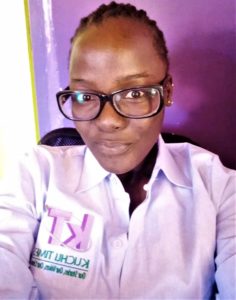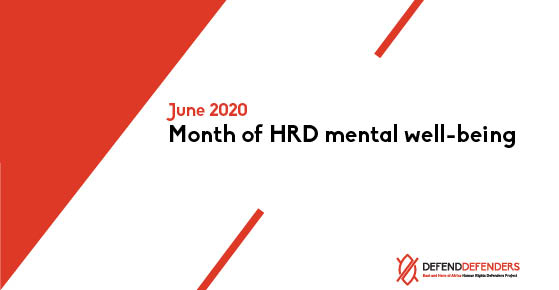The spread of the COVID-19 virus and subsequent lockdowns in many countries all over the world have created fear, anxiety, and uncertainty. Normal life has been interrupted for most people, creating stress and exacerbating mental health issues. Human rights defenders (HRDs) are not spared, especially as we continue to witness and hear about human rights violations and abuses in the enforcement of health directives and guidelines in various countries. Self-care is often the last thing on the minds of frontline human rights defenders, making them particularly vulnerable to negative emotions and health complications. Especially pre-existing conditions like hypertension or depression, can easily intensify during periods of lockdown and/or quarantine, where coping mechanisms, such as going to work, social networking (clubs, places of worship), recreational places or sports, may not be possible. Self-care is a crucial element in making activism sustainable, therefore, DefendDefenders prioritises the well-being of human rights defenders.
Part of DefendDefenders’ core mandate is to ensure the security, safety, and psychosocial wellbeing of human rights defenders in the East and Horn of Africa sub-region. Therefore, we declared June 2020 as the month of HRD mental well-being. During this month, DefendDefenders focused on highlighting the organisation’s work regarding well-being, and sharing the knowledge, skills, and experiences of HRDs. We shared profiles and testimonies of HRDs, videos and tips, and hosted several Zoom sessions.
Listen to our Executive Director Hassan Shire’s final remarks on our month of HRD well-being:
HRD Well-being personalities
During this month of HRD well-being, we want to introduce the people to you that play a key role in DefendDefenders’ mental well-being programne. We’ll start with our Executive Director: Hassan Shire.
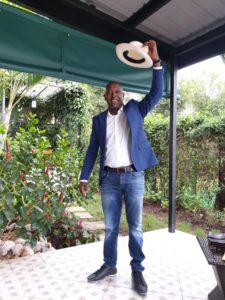
Hassan Shire is the executive director of DefendDefenders (the East and Horn of Africa Human Rights Defenders Project) and Chairperson of the Pan-African Human Rights Defenders Network. Under his leadership, DefendDefenders provides emergency protection and wellbeing support, advocacy, awareness raising, capacity building, and technological support to human rights defenders. Hassan Shire has received numerous awards from the international community including the U.S. State Department’s 2011 Human Rights Defender Award, the Leadership Award of the Pan African Human Rights Defenders Network in 2015, and the Richard C. Holbrooke Leadership Award by Refugees International in 2017. He is extremely empathetic and exhibits deep concern for the holistic protection and wellbeing of HRDS, having experienced tough times as a human rights defender himself including exclusion and isolation when he had to flee to exile in Canada.
Hassan is an artist who uses his musical skill for psychosocial therapy, and human rights advocacy. It was his idea to explore artistic therapy in meeting the mental and emotional needs of HRDs, which idea has ever-since evolved into the Wellbeing and Resourcing Resilience intervention for HRDs under the Protection and Security Management program of DefendDefenders.
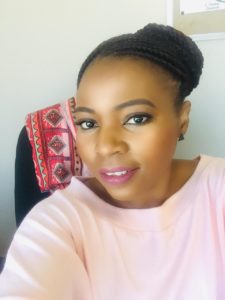
Gugu Shabalala is a trained mental health and psychosocial professional with 13 years of experience in the mental health sector. She focuses on rehabilitation and redress for human rights violations, including war, conflict, and torture, and the resulting impact of such on overall mental well-being of individuals, families, and communities.
“Providing direct services to those who are impacted by human rights violations, I have learned that human beings are capable, and have the potential for, immense resilience. But I also believe that this is only possible if we, as a continent and people, start investing in our mental well-being. We need to develop interventions that help each impacted individual in our society to achieve such resilience,” Gugu says.
Gugu currently works as a Senior Trauma and Psychosocial Professional for the Centre for the Study of Violence and Reconciliation based in South Africa. She provides direct counselling and builds capacity of other professionals to advocate for a psychosocial approach to rehabilitation.
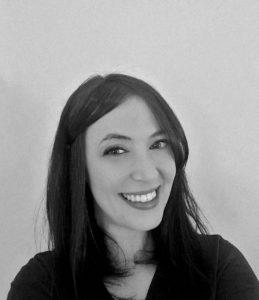
Hajer el-Kefi is a clinical psychologist and project manager at the Tunisian League for the Defense of Human Rights. She also trains several civil society organizations in Tunisia and Morocco on themes relating to the support of vulnerable people. Her areas of expertise are family systemic psychotherapy, organisational analysis, and multidisciplinary support of women and children who have survived violence, with a specific focus on human trafficking victims. Hajer also supervises professionals who work with survivors of trauma. Most of her work is set in the context of defending human rights.
“No one should hesitate to seek help from mental health professionals,” Hajer says. In her work, she has seen that “HRDs can learn to identify personal signs of psychological trauma related to torture, persecution or anxiety for their own safety.” Together with mental health professionals, coping strategies can be developed for such trauma, improving individual’s quality of life and enabling them to continue their work in a sustainable manner.
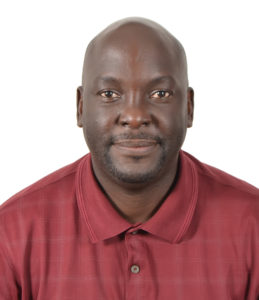
Arthur Simon Ndaula is a clinical psychologist with over eight years of experience working with human rights defenders (HRDs) in the East and Horn of African and Great Lakes regions. Fighting for human rights requires a lot of resilience and can take a toll on HRD’s mental health. Simon has helped them to make sense of their experience through mental health workshops and therapy. It is important to raise awareness around mental health, to improve the psychological well-being of HRDs.
Weekly well-being videos
Day 2: Change (02 June)
Day 9: Stress (09 June)
Day 16: Interpersonal Relationships (16 June)
Day 23: 5 ways to well-being (23 June)
Day 29: HRD well-being (29 June)
Weekly well-being quotes
Day 3 (03 June)
“Self-care is how you take your power back.”
Day 10 (10 June)
“You, yourself, as much as anybody in the entire universe, deserve your own love and affection.”
Day 17 (17 June)
“What mental health needs is more sunlight, more candor, and more unashamed conversation.”
HRD testimonies
Day 4: Henry Ominde (04 June)
HRD for the LGBT+ community with Watu Centre for Health and Advocacy in Kenya
Day 11: Deji Adeyanju (04 June)
Activist and Convener of Concerned Nigerians
Day 18: Diana Karungi (18 June)
Communications Officer at Kuchu Times Media Group
During the COVID-19 crisis in Uganda, I have witnessed through social media a spiraling pattern of human rights violations against sexual and gender minorities. There have also been real life occurrences that almost killed my spirit.
One of them being the recent death of a Ugandan LGBT+ refugee by suicide in Nairobi due to frustration and depression. Living through such experiences, I admit, was detrimental to my mental well-being.
A number of HRDs who brace themselves in the fight against injustices that affect minority groups such as LGBTI+ persons and women are usually not well prepared for the harshness that comes with the territory. With the fiery passion for the work that we so love to do comes the urgency for strength and need to show up amidst the daily upheavals that our community members experience. We get so caught up in looking out for others and forget to take care of ourselves.
HRDs are perceived as heroes but that doesn’t make them any less susceptible to stress, anxiety, panic or burnouts when things hit the fan because what affects the communities we serve does affect us too.
It will be great to integrate free mental health services as part of the post COVID-19 response to help us serve our communities better, because no one can pour from an empty cup.
